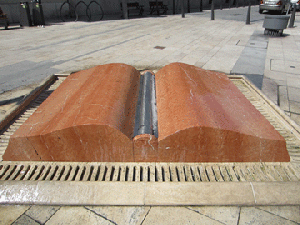Take me to Your Readers
Tonight, I’ll attend my monthly session with my in-person writing group. This group has met for many years, with varying membership, and produced a number of novels and award-winning stories, and all of that good stuff. These are very smart, competent critiquers who often give me great ideas to use in revising my work. And yet, at the end of a meeting where we’ve been discussing my work, I often feel dissatisfied, and wonder if it is the right group for me. Should I have a group of more fantasy writers (this one is mostly SF)? I doubt I could find a more professional or committed group. . .
I love this book fountain in Budapest.
Then I had a chat with a writer-friend about the local, open-to-the-public writer’s group she’s been attending. I was a bit surprised by this. Didn’t she want a genre-specific group, rather than an ad hoc membership, mainly poets and memoirists, who happened to show up that night? Then she revealed her treasure. Instead of sending manuscripts around in advance for detailed reading and commenting, in this group, they simply show up and read a few pages aloud. And she can see in their faces if they’re enjoying the work. She gets the one thing from her group that I often feel is missing from mine: reader reaction.
You can’t beat a cold reading for testing the impact of a work. Do their eyes widen? Do they catch their breath? Are they glancing at watches or making little doodles on their own pages? I realized I’d actually done this with my Dark Crystal novel, The Darkseeing Stars (which you can download for free from my website). I brought it to a local group and read the first five pages out lout–and I could tell they were with me. They were excited by what they heard and they wanted more.
My writer’s group consists of these highly educated, widely published professional WRITERS. Sometimes, they have forgotten they are readers. They are the sort of people who will look up obscure points of Scottish history in order to comment on my work (if they don’t already know the history off the top of their heads, which they often do). They will take apart minute details of plot or character to show exactly why something is confusing or lacks tension. But what they rarely do is simply enjoy. They rarely sit back with the work and just *read* it, and tell me how it made them feel.
We are so well-trained as critiquers of each other’s manuscripts that it’s easy to fall into critical mode and start dissecting. We have, for years, been told we need to come up with evidence from the text, to be able to quote chapter and verse, as it were, to justify a response. So now, we’ve streamlined the process to simply eliminate the response altogether, and present the evidence.
You remember all those English classes where you weren’t allowed to state, “I liked it,” or “I hated it”? Certainly it’s useful to be able to state why, to find some reasons in the text to support the response–almost more helpful for the critic, because that’s how we train our own editorial eye to notice that stuff and do a better job in our own work. When I see or hear a long list of critical remarks about my work, I often am left feeling that it may not be worth revising because the critic didn’t actually like it, and that, really, is the bottom line with commercial fiction.
We need to keep in mind that the key is not to please English teachers with an essay about the themes in the work–the goal is to please a reader who will pick up the book and, if they hate it, put it back down and likely not pick up another one by that author. The people I want to please are not my professional writer-buddies, but my fans and readers. They want a well-written book, sure, but first, they want it exciting, active, engaging, they want a book they won’t want to put down.
Loved it? Hated it? let me know!
#SFWA





